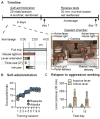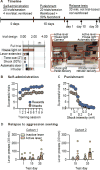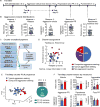Compulsive Addiction-like Aggressive Behavior in Mice
- PMID: 28434654
- PMCID: PMC5532078
- DOI: 10.1016/j.biopsych.2017.03.004
Compulsive Addiction-like Aggressive Behavior in Mice
Abstract
Background: Some people are highly motivated to seek aggressive encounters, and among those who have been incarcerated for such behavior, recidivism rates are high. These observations echo two core features of drug addiction: high motivation to seek addictive substances, despite adverse consequences, and high relapse rates. Here we used established rodent models of drug addiction to determine whether they would be sensitive to "addiction-like" features of aggression in CD-1 mice.
Methods: In experiments 1 and 2, we trained older CD-1 mice to lever press for opportunities to attack younger C57BL6/J mice. We then tested them for relapse to aggression seeking after forced abstinence or punishment-induced suppression of aggression self-administration. In experiment 3, we trained a large cohort of CD-1 mice and tested them for choice-based voluntary suppression of aggression seeking, relapse to aggression seeking, progressive ratio responding, and punishment-induced suppression of aggression self-administration. We then used cluster analysis to identify patterns of individual differences in compulsive "addiction-like" aggressive behavior.
Results: In experiments 1 and 2, we observed strong motivation to acquire operant self-administration of opportunities to aggress and relapse vulnerability during abstinence. In experiment 3, cluster analysis of the aggression-related measures identified a subset of "addicted" mice (∼19%) that exhibited intense operant-reinforced attack behavior, decreased likelihood to select an alternative reinforcer over aggression, heightened relapse vulnerability and progressive ratio responding, and resilience to punishment-induced suppression of aggressive behavior.
Conclusions: Using procedures established to model drug addiction, we showed that a subpopulation of CD-1 mice demonstrate "addiction-like" aggressive behavior, suggesting an evolutionary origin for compulsive aggression.
Keywords: Addiction; Aggression; Mice; Motivation; Relapse; Reward.
Published by Elsevier Inc.
Conflict of interest statement
The authors report no biomedical financial interests or potential conflicts of interest.
Figures




Comment in
-
Reward Mechanisms Across Aggressive and Addictive Forms of Externalizing Psychopathology.Biol Psychiatry. 2017 Aug 15;82(4):e25-e27. doi: 10.1016/j.biopsych.2017.06.028. Biol Psychiatry. 2017. PMID: 28748788 Free PMC article. No abstract available.
References
-
- Grether GF, Anderson CN, Drury JP, Kirschel AN, Losin N, Okamoto K, et al. The evolutionary consequences of interspecific aggression. Ann N Y Acad Sci. 2013;1289:48–68. - PubMed
-
- Crombach A, Elbert T. The benefits of aggressive traits: a study with current and former street children in Burundi. Child Abuse Negl. 2014;38:1041–1050. - PubMed
MeSH terms
Grants and funding
LinkOut - more resources
Full Text Sources
Other Literature Sources

